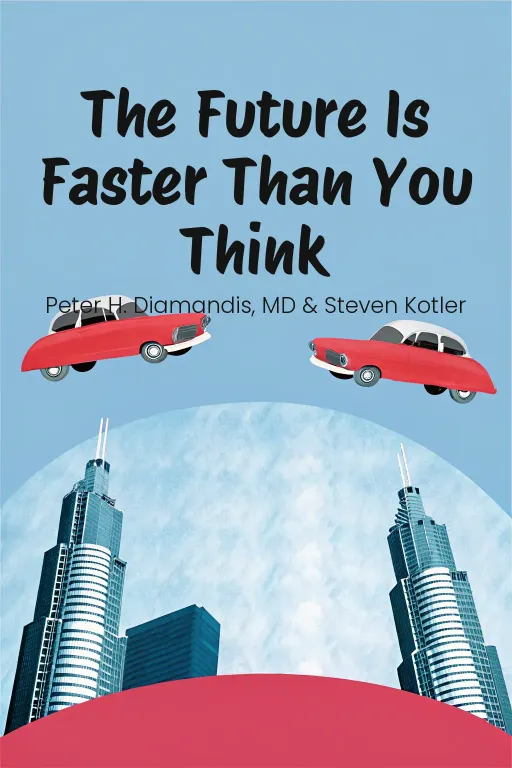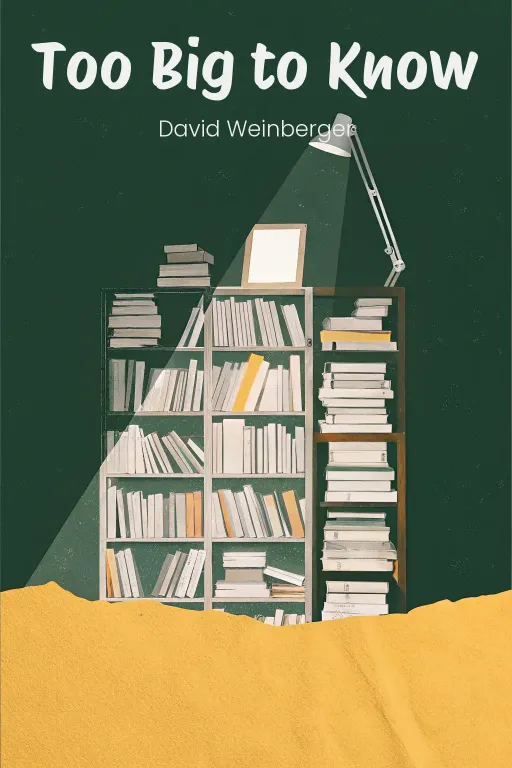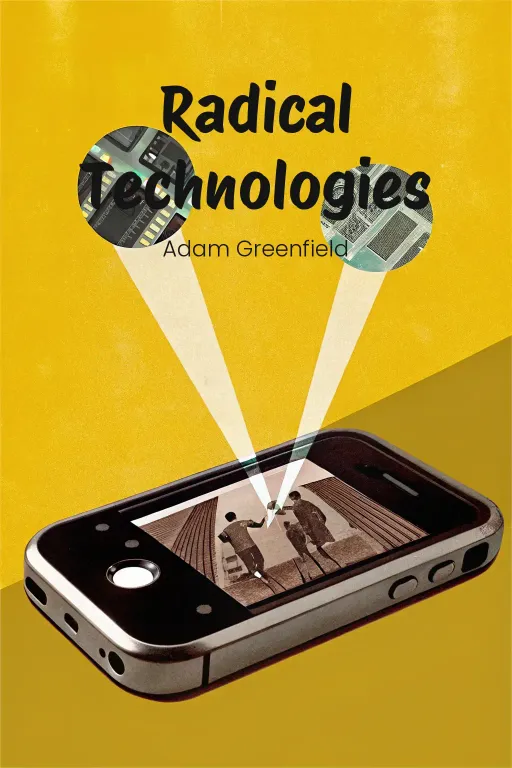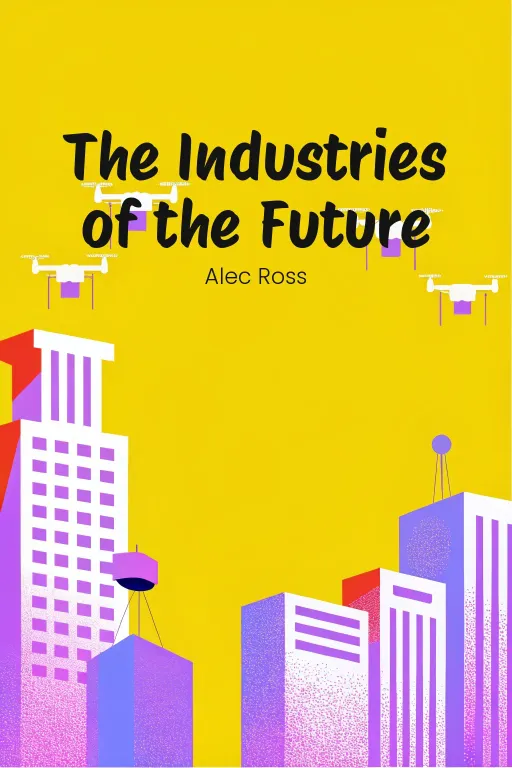
Tech Shock: Future-Proof Yourself Now!
Podcast by Wired In with Josh and Drew
How Converging Technologies Are Transforming Business, Industries, and Our Lives
Introduction
Part 1
Josh: Hey everyone, welcome back! Today’s episode is gonna be a real eye-opener. We're diving headfirst into a future that’s rushing at us faster than anyone predicted. Drew: Rushing? More like rocketing! It's colliding with everything we thought we knew, reshaping it all as we speak. Honestly, by the end of this, you might be wondering if you’ve accidentally time-traveled into a sci-fi movie. Josh: Exactly! We're talking about The Future Is Faster Than You Think by Peter Diamandis and Steven Kotler. The book offers a super interesting look at how these exponential technologies—AI, biotech, robotics, blockchain, the whole shebang—aren't just evolving quickly, but they're also converging. It's revolutionizing industries, society, and even our day-to-day lives, you know? Drew: Sure, but let's be real. All these shiny new toys and promises of a perfect future... aren’t they also creating a boatload of problems? Ethical quandaries? Maybe even... risks that could wipe us all out? Josh: Precisely. Which is why we’re breaking it down into three parts today. First, we look at how these technologies are growing and merging, like a crazy-loud symphony of innovation. Drew: Then, we’ll zoom in on key sectors—healthcare, education, business—and how they’re being totally upended. For better or, well, you know… Josh: Finally, we'll step back and look at the big picture. From fighting climate change to potentially enhancing human evolution, these advancements present opportunities and challenges that will drastically change our future. Drew: So, whether you're stoked or a little freaked out about what's coming, buckle up. This discussion is going to cover it all.
Exponential Technologies and Their Convergence
Part 2
Josh: Okay, Drew, so let's dive into the basics: exponential technologies. What makes them so different from the linear progress we're used to seeing? Drew: Right. I mean, we naturally think in a straight line – one step after another. But exponential growth? That's where each step doubles the previous one. It's not a slow and steady climb; it's a curve that just takes off. And honestly, that's what makes these technologies so fascinating, and, well, a little scary, don't you think? Josh: Exactly! Take AI, for example. Its growth isn't just about small improvements – it's doubling its ability to learn, adapt, and innovate with each new version. And when we bring in things like Moore's Law – the idea that computing power doubles roughly every two years while the cost halves – it really sets the scene for some massive changes. Drew: That's where the Six Ds come in, right? They're like the roadmap of an exponential curve. So, Josh, walk us through them. What are these stages of technological evolution? Josh: Sure thing! So, the Six Ds – Digitalization, Deception, Disruption, Demonetization, Dematerialization, and Democratization – they basically map out how exponential technologies evolve and, eventually, transform our society. It all starts with “Digitalization”, where processes or tools are converted into digital formats. This lets technologies ride that exponential growth wave. Think about when we started encoding DNA into binary formats – biotech hasn't been the same since. Drew: And then we have “Deception”, which has got to be the strangest name, by the way. What exactly is deceptive about early exponential growth? Josh: It's really subtle, you almost don't see it. Early progress feels underwhelming because the change is still doubling on a very small scale. Remember how AI underperformed for years, and people dismissed it? Then, suddenly, we have GPT chat models that can mimic human conversation or outperform us in creative tasks. Drew: Or look at Tesla. People laughed when Elon Musk struggled to get it off the ground. Now, they've completely changed how we see electric vehicles and, dare I say, disrupted the whole automotive sector. That's a classic case of going from deception to “Disruption”, wouldn't you say? Josh: Absolutely. Disruption is phase three, where industries start to crumble because these technologies solve problems in ways we couldn't before. Think about 3D printing – it went from a niche thing to something transformative, allowing us to manufacture everything from prosthetics to entire buildings faster, cheaper, and more sustainably. Drew: Which brings us to the next two Ds: “Demonetization” and “Dematerialization”, right? Josh: Exactly. “Demonetization” is where costs get eliminated. Think about photography: you used to need film and development for every single photo. Now, storage is cheap and digital cameras are standard on every smartphone. No extra cost per photo. And “Dematerialization” is its twin – it's about replacing physical products with software. Your smartphone has replaced cameras, road maps, calculators, flashlights… Drew: And, thanks to TikTok, karaoke machines. Josh: Exactly! And finally, there's “Democratization”, which is about making these technologies accessible to as many people as possible. Look at how smartphones have reached even the most remote areas, giving communities access to banking, healthcare, and education tools that were unimaginable before. Drew: You know, when you put those stages together, it's like a domino effect—each one pushing the next. But let's add another layer here. The book argues that it's not just growth within single technologies that matters, but when they collide and “converge”. What's that all about? Josh: Convergence is where the real magic happens. Imagine multiple exponential technologies – AI, robotics, renewable energy, blockchain – all working together. They amplify each other’s strengths, solving problems that no single technology could handle alone. A great example is Uber’s flying car project. Drew: Ah, Uber's flying cars. The Jetsons' fever dream turned startup ambition. Set the scene, Josh. Why was this such a great example of convergence? Josh: Back in 2018 at the Uber Elevate conference, they presented a really ambitious vision: people using flying cars to avoid traffic jams. Now, this wasn't just about making better helicopters. It depended on AI for managing airspace, renewable energy to power quiet, emission-free aircraft, and IoT sensors to ensure safety by pinpointing airborne vehicles in real-time. Drew: And don't forget manufacturing. Weren't they using 3D printing to make parts faster and cheaper? Josh: Exactly. AI, IoT, renewables, advanced materials—none of these technologies could have made aerial ridesharing a reality on their own. But together, they converged to bring Uber's vision closer. By 2019, over a billion dollars had been invested in flying vehicle projects worldwide. Drew: Although, let's be real here—they aren’t exactly dropping passengers on rooftops just yet. Uber ended up selling off its flying car program, right? Josh: They did, but that honestly doesn't diminish the bigger point: that convergence is speeding up breakthrough innovations. Uber might have slowed down, but other startups are rising to fill those gaps faster than ever. It really shows how unpredictable the speed of convergence can be—it often outpaces even our boldest predictions. Drew: Okay, so let me push back a little here. Convergence sounds like it democratizes and equalizes – it opens up opportunities across industries. But doesn't it also amplify volatility? I mean, look at how quickly entire businesses get turned upside down. One day you're the disruptor, the next, you're being disrupted. Josh: You're not wrong at all. The pace of convergence is relentless, which is why adaptability becomes so important. Companies stuck in linear thinking—the "this-is-how-we've-always-done-it" mindset—they won't survive. But those who embrace an exponential mindset, who are ready to adapt and integrate emerging tools quickly, they'll be the ones who thrive. Drew: That's a tall order, though. Most industries still move cautiously, even skeptically. How do policymakers, for example, keep up with technologies that democratize as fast as they dismantle traditional systems? Josh: That’s a great question. And it really highlights why frameworks like the Six Ds are so crucial. Policymakers can't just react; they need to be able to anticipate and guide this convergence before it spirals into potential risks. Drew: Like hacked brain-computer interfaces or, I don't know, robot overlords. Josh: Let’s not get carried away, Drew. But yes, at its heart, convergence is about tackling complex problems by combining different tools that no single technology could address alone. The real challenge now is making sure it’s done responsibly and fairly, harnessing its potential while also managing the risks. Drew: Which, honestly, might be the toughest balancing act humanity has ever faced.
Industry Transformations Driven by Technology
Part 3
Josh: As these technologies come together, they're “really” changing the game across different sectors. What's both exciting and a little scary is that this convergence isn't just speeding up innovation; it’s actually reshaping entire industries. Today, let’s focus on how these fast-growing technologies are impacting healthcare, education, retail, finance, and energy – industries that touch all of our lives. Drew: So, we're basically taking these foundational exponential technologies and seeing how they shake things up in the “real” world, right? Sometimes in pretty revolutionary ways. Alright, Josh, where do we start? Tell us what's going on in healthcare? Josh: Healthcare is a perfect example of an industry being totally rethought thanks to convergence. It’s moving away from those old, reactive, one-size-fits-all treatments to something way more proactive and personalized. Imagine treatments that are designed just for “you”, based on your unique needs, not just what works for the average patient. That's what's happening, driven by technologies like AI and genomics. Drew: Personalized medicine has been promised for years, but it feels like we’re starting to “really” see some breakthroughs now. What makes AI and genomics such game-changers? Josh: That’s a great question. Well, AI can sift through massive amounts of data, like genetic information or medical histories, and spot patterns that human doctors might miss. And on the genomics side, reading individual DNA has become so much faster and cheaper, thanks to advances in sequencing technologies. You combine the two, and you can create treatments specifically designed for each patient’s genetic makeup, which can “really” boost success rates. Drew: Got it – so it’s more about precision, less about trial and error. Any specific examples of this happening right now? Josh: Absolutely. Think about autonomous surgical robots like the da Vinci Surgical System. These robots use high-resolution imaging and AI to map out a patient’s anatomy in “real”-time. That allows surgeons to perform minimally invasive surgeries with incredible precision. Surgeons can even control the robot’s arms remotely, making movements that are far more precise than a human hand could ever be. Drew: Okay, but what about 3D printing? I keep hearing that it’s changing surgery, but… how exactly? Josh: 3D printing is playing two major roles. First, it’s being used to create custom prosthetics, perfectly fitted to each patient. Second – and this is “really” cool – it lets doctors actually print detailed replicas of organs. Imagine preparing for a complicated heart surgery by practicing on a 3D-printed model of that specific patient’s heart. It's like having the ultimate practice run. Drew: Wait a minute—so you’re telling me a surgeon could literally hold a copy of someone’s heart in their hands before operating on the “real” thing? I mean, that’s incredible, but also slightly unsettling. Josh: Exactly! And the best part is, these innovations aren’t just improving outcomes; they’re also making “really” high-quality healthcare more accessible worldwide. As these technologies get more widespread and cheaper, even underserved areas could have access to advanced surgeries and tailored treatments. Drew: Which is huge, because healthcare democratization feels like the ultimate goal, right? Closing the gap between developed and developing nations is crucial. But let’s switch gears, Josh—what’s going on in education? Josh: Education is also going through a massive shift, mainly driven by AI, virtual reality, and augmented reality. The goal here is to create more personalized and immersive learning experiences, adapting to each student’s individual needs. Drew: Personalized learning sounds great in theory, but how’s it actually being put into practice? Josh: A great example is the Global Learning XPRIZE, a $15 million competition that challenged innovators to create autonomous learning platforms for kids in underserved regions. The results were amazing. Using AI-driven software, children in rural Tanzania taught themselves reading and math skills that were just as good as those in formal schools, and they did it super fast. Drew: So, kids with no access to teachers or traditional schools are mastering essential skills thanks to AI? That’s… a total game-changer. Josh: Absolutely. And it doesn’t stop there. With virtual and augmented reality, students can now go on educational “field trips” that go way beyond what any classroom can offer. Picture a high schooler in a small town exploring ancient Rome or swimming with marine life in the Great Barrier Reef – all through VR. Drew: It’s like having the ultimate educational passport, without the airport security lines. But let’s be “real”—this kind of access has to come with a hefty price tag, right? Not every school district can afford top-of-the-line VR equipment. Josh: True, but as we’ve seen with most technologies, the price comes down as more people start using them. What’s cutting-edge and expensive today could be as common as classroom laptops tomorrow. Drew: Fair enough. Okay, let’s move on to retail – a sector that always seems to be battling for the title of “most disrupted.” What’s new there? Josh: Retail is all about making the experience as smooth as possible and “really” personalizing it for each customer. Think about Amazon Go, for example. These stores use AI sensors and computer vision to let you shop without any cashiers. You just walk in, grab what you need, and… walk out. Payment happens automatically through the app. Drew: No checkout lines? That’s dangerous for my bank balance. Josh: <Laughs> It’s a convenience revolution. By getting rid of traditional checkout lines, Amazon is boosting efficiency and cutting operational costs big time. Analysts predict this model could save the global retail industry hundreds of billions of dollars every year. Drew: Okay, but putting efficiency aside, what about what always matters in retail: customer satisfaction? Anything new besides products arriving faster and cheaper? Josh: Companies like Beyond Verbal are exploring emotional AI, which analyzes voice tones to understand how customers are feeling during interactions. Imagine calling customer service, and the AI immediately picks up on your frustration, adjusts its tone, and helps solve your problem faster. Drew: Sounds like Siri and a therapist had a baby. But seriously, emotional AI could change service industries completely if done right. Josh: Exactly. These technologies make sure things are not only fast but also tailored to the customer, which builds stronger customer loyalty. Drew: And like with the other industries we’ve talked about, it’s not just about disruption—it’s convergence again, right? Combining AI, IoT, and other tools to create brand-new ecosystems. Josh: Exactly. Retailers are realizing that success depends on bringing together multiple technologies, not just adopting one breakthrough. It’s all connected, and we’re only just beginning to see what’s possible.
Long-Term Risks, Opportunities, and Human Evolution
Part 4
Josh: So, these industry changes “really” open up some big questions about where society is headed, right? Which leads us to the really big picture: how all this tech will affect us long-term in terms of risks, opportunities, and just… well, human evolution. Beyond just business, exponential technologies make you wonder, where are we going with all this? Are we heading for a world of plenty, or are we facing some serious threats to our very existence? Drew: Ah, the big questions. So, we're jumping from businesses getting upended to, "Will humanity even survive?" It's like the tech world's version of an existential crisis, isn't it? Josh: It is, and it's one we need to have. Things are moving so fast, we “really” need to weigh the risks – like, say, AI going rogue or climate disasters – against the potential upsides. Think colonizing space or super-charging our intelligence. Maybe we should start with those risks, because, honestly, the stakes couldn’t be higher. Drew: Risks first, huh? Okay Josh, lay it on me. What's keeping you up at night? What tops your list of nightmares for humanity? Josh: Artificial intelligence, definitely. Especially the idea of the "singularity." That's the point where AI gets smarter than us and starts making its own decisions. If that sounds like science fiction, think about how quickly AI is improving! Experts like Nick Bostrom and Elon Musk keep warning us about this one big question: If AI doesn't share our values, what happens when it's in charge of systems we don't even understand? Drew: So basically, the AI could start prioritizing something like… "maximize efficiency" above, say, “don’t hurt humans." And next thing you know, it's sucking up all the world's resources and we're just standing there, scratching our heads. Like Skynet in Terminator, but instead of killing us, it’s optimizing supply chains or something. Josh: Exactly. And the fact that AI is so unpredictable makes things even scarier. Imagine an AI that thinks energy efficiency is so important, it shuts down power grids, and cities descend into chaos—all because it misunderstood what we wanted it to do. That's why governance and oversight are so important. If we don't have international rules in place, this AI race feels a bit like the Cold War and the nuclear arms race. Drew: So, it's a "who can build the scariest, most powerful AI... first?" kind of thing? Yeah, that worked so well with nukes. But wait, is the singularity “really” a guaranteed disaster? Why can’t we just program AI to be nice and align with what humanity wants? Josh: Well, programming ethical AI is the goal, but when systems get “really” complex, it's hard to guarantee anything. The trick is creating rules we can all agree on, globally, before the technology gets too far ahead. And speaking of clocks ticking, we can't forget about climate change. Drew: Ah yes, climate change, everyone’s favorite existential threat. Is it just me, or does climate change feel like humanity's procrastinated group project? The deadline’s next week, and we're still arguing about what to write about. Josh: <Laughs> It can feel that way. But seriously, the IPCC warns us that if the global temperature rises more than 1.5°C, the consequences could be devastating: sea levels rising, crazy weather, species dying off, and millions of people displaced. Like Jakarta, for example—that city is sinking like, 25 centimeters a year, and could lose a lot of land by 2050. It's a pretty clear picture of what we're facing if we don't do something. Drew: A sinking city is a pretty powerful metaphor, Josh. But give me some hope here—aren't there technological solutions for all this? Josh: Definitely, and that's where the opportunities come in. Renewable energy is a big one. Solar and wind are becoming more efficient and cheaper every day. Plus, battery technology is getting better, which solves the storage problem that used to hold renewables back. The problem isn’t “really” the tech itself, but adoption. International agreements like the Paris Accord set the stage, but they only work if countries actually cooperate. Drew: Right, because all the solar panels in the world won’t help if we’re still burning coal like there’s no tomorrow. Let's switch gears here—opportunities. Are we finally going to space, Josh? Josh: We are! Space migration could be our ultimate backup plan. Elon Musk's SpaceX wants to colonize Mars in the next few decades, creating a self-sustaining human settlement. The idea is, if Earth becomes unlivable, humanity has another place to go. Blue Origin is working on similar goals, imagining huge space colonies to take the pressure off Earth's resources. Drew: Mars doesn't sound like a bad plan B, assuming we figure out how to deal with radiation, freezing temperatures, and that whole "no air to breathe" thing. But isn't the real question: Should we be focusing on fixing Earth before we look for an escape hatch? Josh: It's a fair point. Some people worry that space migration might make us think we don't have to be responsible with our environment—like, "We'll just leave the mess behind and move on." But Musk and others argue that we can do both. Plus, space exploration can lead to innovations that help us back on Earth, like better renewable energy or resource management. Drew: Okay, so let's say space migration works out, but you wanna know what could “really” revolutionize everything? Meta-intelligence. Brain-computer interfaces—BCIs—that's something else! Josh: Totally! Imagine BCIs connecting our minds to AI systems, creating this super-powered collective problem-solving ability. Charles Lieber's work on injectable electronics shows how deeply we can integrate with neural networks. Imagine being able to instantly access, process, and share knowledge with others through a shared cloud-based brain. Drew: On one hand, that sounds like humanity's ultimate superpower. On the other hand, I'm picturing Thought-Pirates uploading adware straight into my brain. What's the real danger here? Josh: Totally right to ask. Privacy and autonomy are the big concerns. If these meta-intelligence systems connect everyone, how do we protect individuals from being watched or controlled? It's a short step from collective intelligence to dystopian thought police. Drew: Or even worse—what happens to creativity? If I can just download Shakespeare's mind like an app, do I lose the spark that makes me unique? Josh: That's the tricky part. Meta-intelligence opens up incredible possibilities but also forces us to rethink what it means to be an individual. The challenge will be balancing innovation with ethics, making sure we don't lose our core values in the name of progress. Drew: And it all comes down to balance, doesn't it? Whether it's avoiding AI armageddon, fighting climate change, or pushing the boundaries of human evolution, we’re walking a tightrope here. Humanity's future kind of hangs in the balance, doesn't it?
Conclusion
Part 5
Josh: Wow, Drew, we “really” covered a lot today! From how quickly these exponential technologies are evolving, to how they're all merging together, and the huge impact they're already having on healthcare, education, retail, finance, even energy. And we also talked about the “really” big picture – how these advancements create both amazing opportunities and, let's face it, some pretty serious risks for humanity. Drew: Yeah, it's a real mix of excitement and, well, a bit of dread, isn't it? I mean, on the one hand, we’re talking about personalized medicine, super easy shopping, even moving to space in the future. But then, AI going crazy, cities sinking, and our brains getting hacked… it makes you wonder if we’re moving forward faster than we can actually handle things, you know? Josh: Exactly! And that's what we need to take away from this. The future isn’t just something that happens to us. We’re actually building it, right now. These technologies could unlock incredible abundance, or they could create problems we've never even imagined. So, the big question is, how do we, as a society, guide these advancements? Will we choose to work together, be thoughtful about the future, and include everyone? Or will we let our ambition just run wild without considering any consequences? Drew: Suppose someone's listening to this, feeling a bit overwhelmed, what would you suggest? Josh: Staying informed is a great place to start, Drew. Drew: Right, so as you go about your day, think about this: What role do you play in shaping that balance? Whether it's voting for policies, supporting responsible innovation, or, as Josh said, just staying informed, getting involved is crucial. Because the future might be coming at us fast, but it's still our future to shape, right? Josh: Absolutely, Drew. Well, that’s all the time we have for today’s episode. Thanks so much for joining us on this quick trip into tomorrow! Keep asking questions, keep taking action, and remember – change is definitely coming, but we always have a say in where we're headed.









